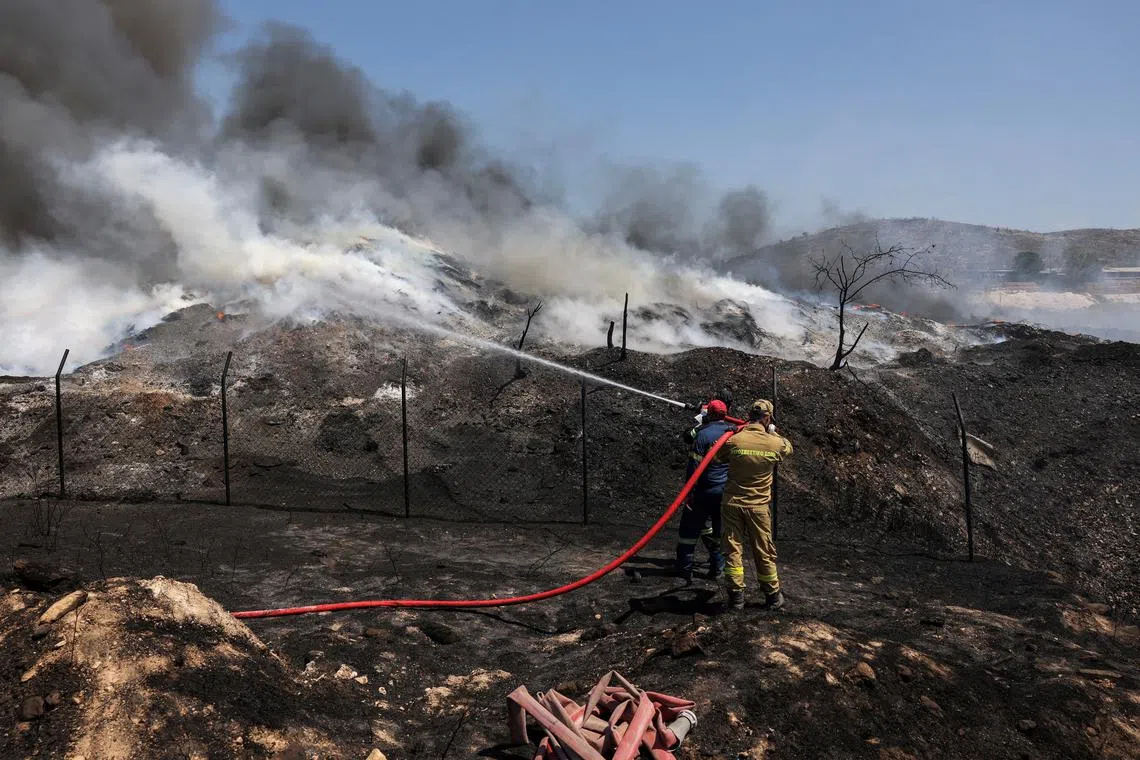European countries cut back on firefighters even as blazes ravage continent
Sign up now: Get ST's newsletters delivered to your inbox

Greece expanded its fire brigade by almost 60 per cent in 2022, which would have helped battle the blazes last month.
PHOTO: REUTERS
BRUSSELS – Most countries in Europe are paring their army of firefighters, even as the continent battles increasingly intense heatwaves
European Union member states saw the number of firefighters drop by 1.5 per cent in 2022 to less than 360,000 compared with the year before, according to a statement on Tuesday from the European Trade Union Confederation, or ETUC, citing Eurostat data.
Slovakia, Bulgaria and Portugal saw the biggest percentage drops year on year, while France cut the highest number of these professionals.
The only notable exceptions that actually bolstered their firefighting forces were Spain, Italy and Greece. These are countries that have been on the front lines of devastating heatwaves and wildfires in the past couple of months.
Greece expanded its fire brigade by almost 60 per cent in 2022, which would have helped battle the blazes in July that forced evacuation of thousands of people
The country plans to recruit 500 new firefighters, according to Mr Vassilis Kikilias, Greece’s Minister of Climate Crisis and Civil Protection.
The statistics add to concerns that most parts of Europe are leaving themselves vulnerable to a growing risk of fires as extreme weather events lash across the continent.
The planet is rapidly warming and has already seen the hottest June and July on records.
However, countries are caught between tackling climate change in the long term and battling inflation plus economic slowdown in the shorter term, which is squeezing government budgets.
Trade unions worry that macroeconomic compulsions could lead to further cutbacks.
The ETUC estimates that EU deficit rules mean that 14 member states would have to cut their spending by a minimum of €45 billion (S$66 billion) in 2024.
“Cutting the number of firefighters in the midst of a climate crisis is a recipe for disaster,” Ms Esther Lynch, ETUC’s general secretary, said in the statement. “I’m concerned more cuts could be on their way if the EU reintroduces austerity rules next year.”
As of Tuesday, around 3,000 firefighters were tackling wildfires across Portugal after more than 1,000 people fled a blaze in the southern part of the country.
Fossil fuel emissions are driving global warming, with temperatures topping 40 deg C across parts of Portugal and Spain.
Italy saw an unprecedented heat wave in Sardinia in July, as temperatures nearly touched 46 deg C and led to heatstroke deaths.
Wildfires in Canada have already charred more than 10 million ha this summer – roughly the size of Iceland.
The EU member nations are not the only ones affected by fewer provisions for tackling blazes.
British had 21 per cent fewer firefighters as of March 2022 than it did 10 years ago.
Central funding for fire and rescue services in England fell by almost a quarter over the last decade in money terms, according to the Fire Brigades Union.
“All countries should be investing in their fire services and other public services to meet the increased burden that will be put on them by climate change,” Ms Lynch said. “But it’s clear from these figures that investment is already insufficient.” BLOOMBERG


